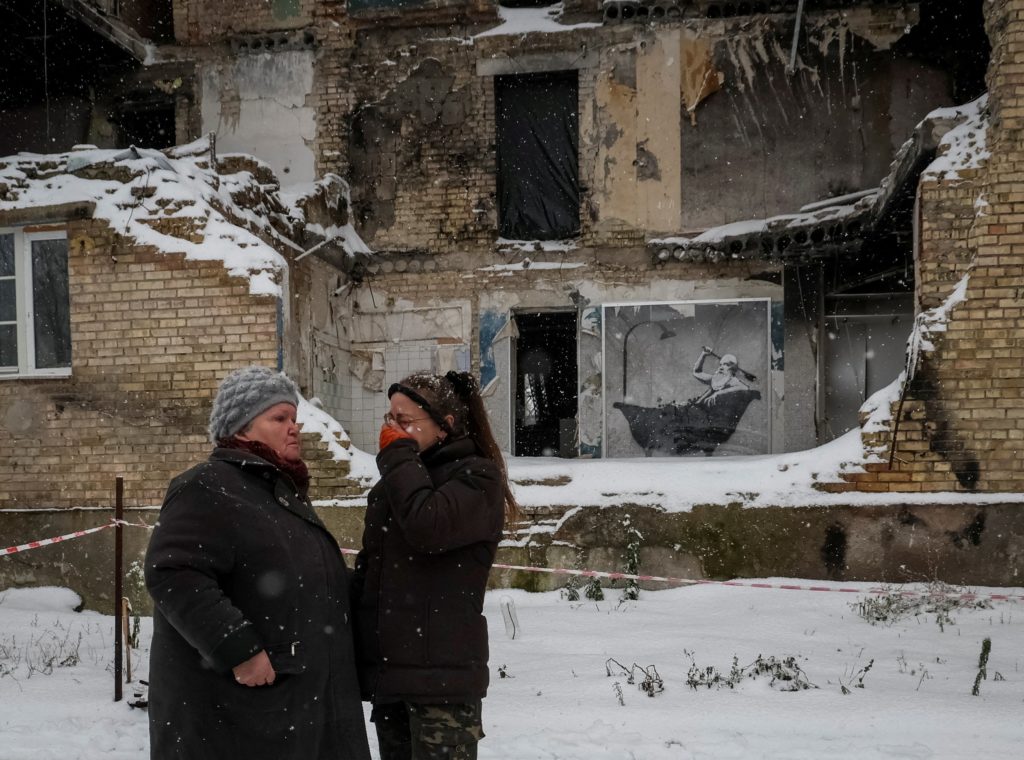In recent weeks, several people have mentioned to me that it feels as if we are reliving the 1930s. Dictators rattling their sabers, or more aptly, their missile silos. Threats and conflicts and disasters piling upon one another, from Gaza to Kharkiv, from the chaos in Congress to the straits of Taiwan.
Some read the news accounts with the nausea that comes with a sense of impending doom. I know others who simply avoid the news, either unable to deal with the provoked anxiety or unable to see how these dismal stories might impact them.
When my own thoughts turn gloomy, I turn to poetry, specifically W. B. Yeats:
“Things fall apart; the centre cannot hold;
Mere anarchy is loosed upon the world…
The best lack all conviction, while the worst
Are full of passionate intensity.”
The Irish poet’s verse “The Second Coming” warns of a “rough beast, its hour come round at last.” We see so many threats now “slouching towards Bethlehem.”
How do we focus on all the dangers in our midst, on all the suffering that swirls about us? It seems impossible that in less than two years America would weary of aiding Ukraine’s existential fight against a ruthless invader, yet according to voices in Congress, it has. Or perhaps now we can only focus on the grievous massacre of Israelis by Hamas militants and the subsequent obliteration of whole neighborhoods in Gaza as Israel seeks to punish the perpetrators. Or maybe it is the numerous mass shootings in our own land, or the crisis at the border. When do cascading tragedies simply become distractions?
Pope Francis, like his predecessors, appeals for peace. His words may at times be misconstrued as favoring one side or another when his primary concern is to stop the killing. Popes are less concerned about territorial boundaries or historic grievances than the here-and-now of human suffering, but human beings have trouble letting go of their hatreds.
Yuval Noah Harari, a professor of history at Jerusalem’s Hebrew University, wrote in a New York Times column recently: “As a historian, I know history’s curse is that it inspires a yearning to fix the past. That is hopeless. The past cannot be saved. Focus on the future. Let old injuries heal rather than serve as a cause for fresh injuries.”
Vladimir Putin dreams of a lost Russian empire. Hamas dreams of martyrdom and the extermination of Israel. Some Israelis dream of restoring all the historic lands of biblical Israel and making the Palestinians go away. The past is a knife’s blade held to our throats.
As in the 1930s, there are also voices telling us these are not our problems. “It is what it is,” is our world-weary cliché. Let the world take care of its messes and leave us alone. We know how well such isolationism turned out in the ’30s. Yet we also know we cannot unilaterally fix every problem, resolve every conflict. Carrier groups serve their purpose at times, but a deck full of F-16s can’t blow away grievances and hatreds. Bombs cannot obliterate the past.
Archbishop Gabriele Caccia, the Vatican’s permanent observer at the United Nations, has the thankless job of encouraging dialogue rather than conflict. He told the U.N. Security Council recently that while dialogue seems impossible right now, it is the “only viable option for a lasting end to the cycle of violence” that has plagued the Holy Land.
Likewise in Ukraine there is a blood-soaked stalemate. Russia continues to feed its young into the Ukrainian meat grinder, with each side hoping the other bleeds out first.
Sometimes war ends only when combatants are exhausted. Much can happen before that point, little of which is good.
So what can we who feel voiceless do?
Francis recently called for a world day of prayer, penance, and fasting for peace for Oct. 27, but few people heard his appeal because there was so little time to promote it. The effort reminded me, however, of the dramatic moment on March 27, 2020, when in the rainy, windswept piazza of St. Peter’s, the solitary figure of the pope called us to pray for the world.
At that moment, we were paralyzed by fear of the COVID pandemic as thousands died and morgues overflowed.
Pope Francis used that moment to challenge us. “Why are you afraid?” he quoted the Gospel. “Have you no faith?”
Once again, the night is dark and people are afraid. We talk often about “thoughts and prayers,” but maybe at this time in history when too many regions of the world seem teetering into chaos, we need a visible, collective prayer for the wisdom and the strength to find a way forward to peace.
Muslims, Jews, and Christians say they believe in prayer’s power. Maybe it is time for the pope to challenge us once again.

